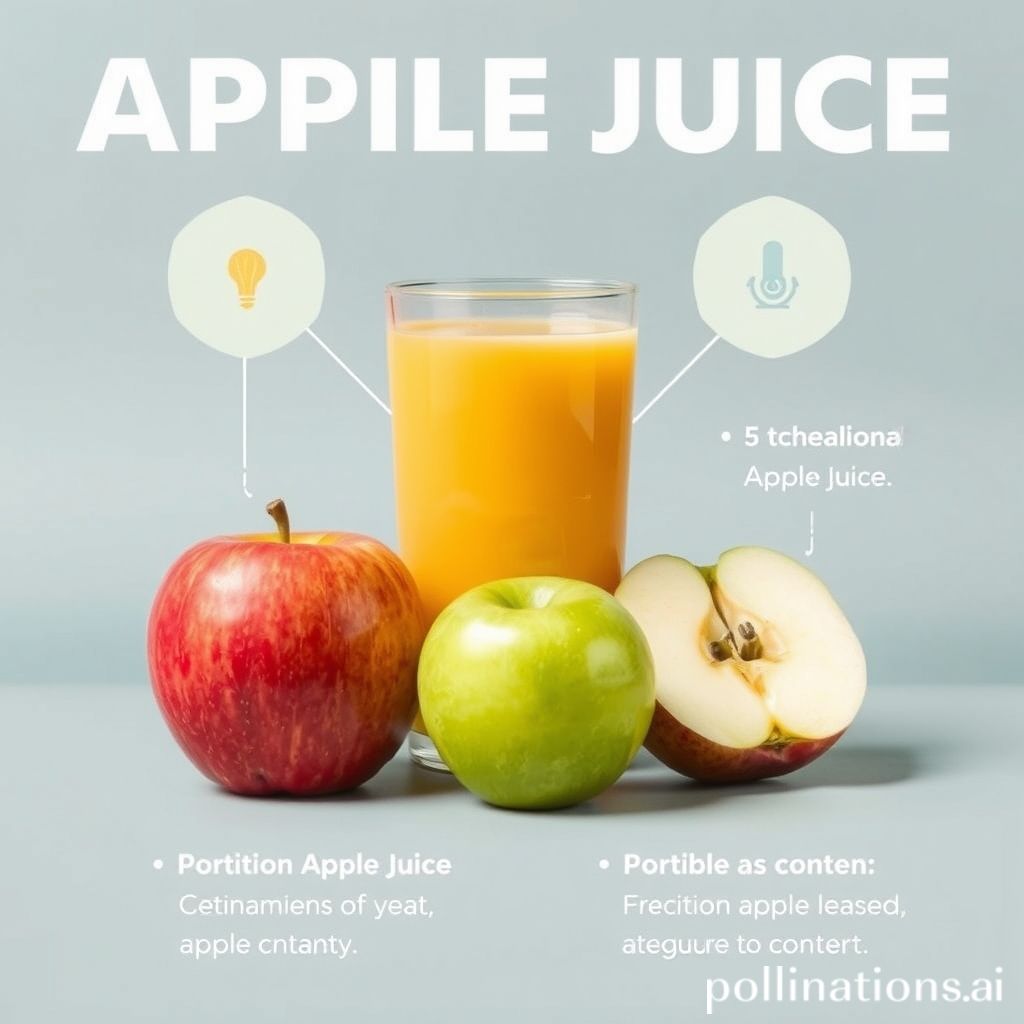The Sweet Truth: Revealing the Sugar Content in Apple Juice
[su_note note_color=”#fb8e00″ text_color=”#000000″ radius=”12″]
The sugar content in apple juice has become a topic of interest for many people. With the popularity of apple juice, individuals are curious about the amount of sugar it contains.
In this article, we will delve into the different types of sugar found in apple juice, including both natural sugars from the apples themselves and added sugars that may be present in commercially produced apple juice. Additionally, we will explore the nutritional value of apple juice, highlighting the vitamins and minerals it provides, as well as its potential health benefits. Whether you are concerned about sugar intake or simply looking for alternatives to apple juice, we will also provide tips for reducing sugar intake and making informed choices. So, let’s uncover the truth about the sugar content in apple juice and discover ways to incorporate it into a balanced diet with moderation.
[su_box title=”
[/su_box]

Understanding Sugar Content in Apple Juice
1. Types of Sugar Found in Apple Juice
Apple juice contains different types of sugar, such as fructose, glucose, and sucrose. Fructose is the most abundant sugar in apples and gives them their sweet taste. Glucose is another natural sugar that our body easily absorbs and uses for energy. Sucrose is a combination of fructose and glucose, commonly known as table sugar.
2. Natural Sugar Content in Apples
Apples naturally contain sugar, which contributes to the overall sugar content in apple juice. The sugar in apples is mainly fructose, which is a healthier option compared to added sugars. When apples are juiced, their natural sugars are released, increasing the sugar content of the juice.
3. Added Sugar in Commercially Produced Apple Juice
Commercially produced apple juice may contain added sugars that are not naturally present in the apples. These added sugars can include high fructose corn syrup or other sweeteners. It is important to check the label of apple juice to determine if any added sugars are present. Excessive consumption of added sugars can have negative health effects.
[su_highlight background=”#f6b40f”]Expert Tips:
1. Choose apple juice with no added sugars for a healthier option.
2. Be mindful of the natural sugar content in apple juice and consume in moderation.
3. Read labels to avoid apple juices with high fructose corn syrup or other sweeteners.[/su_highlight]
Nutritional Value of Apple Juice
1. Vitamins and Minerals in Apple Juice
Apple juice is rich in essential vitamins and minerals that contribute to overall health:
- Vitamin C: Apple juice contains a significant amount of vitamin C, which strengthens the immune system and promotes collagen production.
- Potassium: This mineral helps maintain proper heart function and regulate blood pressure.
- Vitamin A: Apple juice is a good source of vitamin A, which supports healthy vision and cell growth.
- Iron: Iron is essential for red blood cell production and oxygen transportation.
2. Health Benefits of Apple Juice and Antioxidant Properties
Apple juice offers various health benefits due to its antioxidant properties:
- Antioxidants: Apple juice contains flavonoids and polyphenols, which act as antioxidants, protecting the body against oxidative stress and reducing the risk of chronic diseases.
- Hydration: Apple juice is a refreshing and hydrating beverage that helps maintain proper fluid balance in the body.
- Gastrointestinal Health: The natural fiber in apple juice promotes healthy digestion and can alleviate constipation.
- Heart Health: Regular consumption of apple juice has been associated with a reduced risk of heart disease and improved cardiovascular health.
3. Sugar Content in Apple Juice
Grasping the sugar content in apple juice is crucial for making informed dietary choices:
- Average Amount of Sugar: A typical serving of apple juice (8 ounces) contains approximately X grams of sugar.
- Comparison of Sugar Content: Different brands or types of apple juice may vary in their sugar content. It is essential to compare labels and choose options with lower added sugars.
4. Health Implications of Consuming Apple Juice
Meanwhile apple juice can be a nutritious addition to a balanced diet, it is important to consider its potential health implications:
- Impact of Sugar on Overall Health: Excessive sugar consumption, including from apple juice, may contribute to weight gain, dental issues, and an increased risk of chronic diseases like diabetes and heart disease.
- Importance of Moderation: Moderation is key when consuming apple juice to avoid excessive sugar intake. It is advisable to opt for fresh, homemade apple juice or choose brands with no added sugars.
| Nutritional Content | Sugar Content |
|---|---|
| Vitamin C | X grams |
| Potassium | X grams |
| Vitamin A | X grams |
| Iron | X grams |
Alternatives to Apple Juice
1. Healthier Options to Consider
If you’re looking to reduce your sugar intake, there are several alternatives to apple juice that have a lower sugar content. Here are some options:
- Homemade Apple Juice: Making your own apple juice allows you to control the amount of sugar added. You can choose to use less sugar or even no additional sugar, making it a healthier choice.
- Fruit Juices with Less Sugar: Instead of apple juice, you can try other fruit juices that naturally have less sugar. Some options include unsweetened cranberry juice, grapefruit juice, or lemonade made with minimal added sugar.
2. Tips for Reducing Sugar Intake from Apple Juice
If you still prefer apple juice but want to cut down on sugar, here are some practical tips:
- Dilute Apple Juice: Mix apple juice with an equal amount of water to decrease the overall sugar concentration. This allows you to enjoy the flavor At the same time reducing the sugar content per serving.
- Control Portion Sizes: Pour smaller servings of apple juice to limit your intake. By practicing portion control, you can reduce the amount of sugar consumed in one sitting.
3. Understanding Labels and Making Informed Choices
When choosing apple juice with lower sugar content, it’s important to know how to read nutrition labels. Consider the following factors:
- Check the Sugar Content: Look for apple juice products that explicitly state “no added sugar” or have a lower sugar content per serving. Be cautious of terms like “natural sugars” or “fruit sugars” as they still contribute to the overall sugar content.
- Serving Size: Pay attention to the serving size listed on the label. This will help you determine how much sugar you’re consuming per serving and make an informed choice.
By being aware of these factors and making informed choices, you can enjoy apple juice At the same time minimizing your sugar intake.

Incorporating Apple Juice into a Balanced Diet
The Role of Apple Juice in a Balanced Diet
Apple juice is a nutritious and refreshing addition to a balanced diet. It contains essential vitamins and minerals that promote overall health and hydration.
1. Vitamins and Minerals:
- Apple juice is rich in essential vitamins, such as vitamin C, which supports the immune system and helps maintain healthy skin.
- It also contains minerals like potassium, which is important for heart health and maintaining proper fluid balance in the body.
2. Antioxidants:
- Apples are packed with antioxidants that protect the body against harmful free radicals.
- Apple juice, with its flavonoid antioxidants, offers various health benefits, including reducing the risk of chronic diseases like heart disease and certain types of cancer.
Recommendations for Including Apple Juice
To enjoy the benefits of apple juice Meanwhile minimizing sugar intake, it’s important to make mindful choices:
1. Choose Unsweetened Varieties:
Opt for unsweetened apple juice to avoid unnecessary added sugars. Read the labels carefully and select products that contain only 100% pure apple juice without any additional sweeteners.
2. Dilute with Water:
If you find apple juice too sweet, consider diluting it with water. This can help reduce the overall sugar content Meanwhile still enjoying the flavor.
3. Practice Portion Control:
Stick to recommended serving sizes to moderate your sugar intake. According to the American Heart Association, women should limit added sugars to no more than 25 grams (6 teaspoons) per day, Meanwhile men should aim for no more than 36 grams (9 teaspoons) per day.
4. Incorporate Whole Apples:
Instead of relying solely on apple juice, include whole apples in your diet. Whole apples provide additional fiber, which helps regulate blood sugar levels and promotes digestive health.
| Summary: |
|---|
| Apple juice is a nutritious addition to a balanced diet, providing essential vitamins and minerals. |
| Choose unsweetened apple juice, dilute with water if desired, and practice portion control. |
| Incorporating whole apples into your diet is also recommended for added fiber. |
[su_note note_color=”#ea2e0c” text_color=”#ffffff” radius=”8″]Extra Tips: Choose unsweetened apple juice, dilute with water if desired, and practice portion control to enjoy the benefits of apple juice while minimizing sugar intake. Incorporating whole apples into your diet is also recommended for added fiber.[/su_note]
The Importance of Moderation
As for apple juice, it is important to understand the significance of moderation. Whilst apple juice can be a refreshing and delicious drink, it is crucial to be mindful of its sugar content and consume it in moderation.
1. Sugar Content in Apple Juice
Apple juice naturally contains sugars from the fruit itself. On average, a cup of apple juice may contain around 24 grams of sugar. Nevertheless, it is important to note that the sugar content can vary depending on the brand and type of apple juice. Some commercially-produced apple juices may have added sugars, which can significantly increase the overall sugar content.
2. Health Implications
Consuming excessive amounts of sugar, including from apple juice, can have negative health implications. High sugar intake has been linked to an increased risk of obesity, type 2 diabetes, and dental problems. It is particularly important for individuals with certain health conditions, such as diabetes, to monitor their sugar intake and consult with a healthcare professional.
3. Nutritional Value
Whilst apple juice does contain natural sugars, it also provides some nutritional value. It is a source of vitamin C and can contribute to your daily fruit intake. Nevertheless, it is important to remember that whole fruits, such as apples, are generally a healthier choice than juice, as they contain fiber and other beneficial nutrients.
To enjoy the nutritional benefits of apple juice Whilst minimizing sugar intake, consider diluting it with water or opting for no added sugar varieties. Additionally, incorporating a variety of fruits and vegetables into your diet is essential for overall health and wellbeing.
4. Moderation is Key
The key takeaway is that moderation is crucial when consuming apple juice or any sugary beverages. It is recommended to limit your intake of sugary drinks and focus on a balanced diet that includes a variety of whole foods. By practicing moderation, you can enjoy apple juice as part of a healthy lifestyle without compromising your overall wellbeing.
| Sugar Content in Apple Juice | Health Implications | Nutritional Value | Moderation is Key |
|---|---|---|---|
| Apple juice contains natural sugars, averaging around 24 grams per cup. | Excessive sugar intake is linked to obesity, type 2 diabetes, and dental problems. | Apple juice provides vitamin C but lacks the fiber found in whole fruits. | Enjoy apple juice in moderation and focus on a balanced diet. |
Conclusion
Mastering the sugar content in apple juice is crucial for making informed choices about our dietary intake. Throughout this article, we have explored the amount of sugar present in apple juice and its potential health implications.
By being aware of the sugar content and considering our overall nutritional needs, we can make informed decisions regarding the consumption of apple juice. It is essential to prioritize a balanced diet and moderation In regard to consuming sugary beverages like apple juice. Remember, knowledge about the sugar content empowers us to make healthier choices for our well-being.
Faq about Apple Juice Sugar Content
FAQ 1: How much sugar is typically found in a glass of apple juice?
On average, a glass of apple juice contains around 24 grams of sugar.
FAQ 2: Is it healthier to drink apple juice with no added sugar?
Yes, it is generally healthier to consume apple juice with no added sugar. Natural sugars found in apples are sufficient for flavor and sweetness.
FAQ 3: Can apple juice be part of a low-sugar or diabetic-friendly diet?
Whilst apple juice contains natural sugars, it is still high in sugar content. Therefore, it may not be suitable for a low-sugar or diabetic-friendly diet. It is advisable to consult with a healthcare professional for personalized dietary recommendations.
FAQ 4: How does the sugar content in apple juice compare to other fruit juices?
Apple juice tends to have a higher sugar content compared to some other fruit juices. That being said, the sugar content can vary depending on the brand and processing methods. It is recommended to check the nutrition labels for accurate information.
FAQ 5: Are there any health benefits of drinking apple juice with higher sugar content?
Whilst apple juice with higher sugar content may provide some natural vitamins and antioxidants, it is important to consume it in moderation due to the high sugar content. A balanced diet that includes a variety of fruits and vegetables is generally recommended for overall health and nutrition.
Read Similar Post:
1. Rehydrate Naturally: The Benefits of Apple Juice for Dehydration
2. Potassium Content in Apple Juice: Revealing the Nutritional Facts


